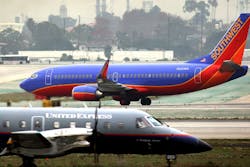United Says Expanding Hobby Would Cost Jobs, Hurt Economy
May 04--Expanding Hobby Airport to accommodate international commercial flights will cost the Houston area 3,700 jobs and $295 million annually in economic activity, according to a study released by United Airlines on Thursday.
United's conclusions are in stark contrast to the economic projections in a study commissioned by the Houston Airport System that concluded an international Hobby would create more than 10,000 jobs and inject $1.6 billion into the local economy annually.
Southwest Airlines is proposing a $100 million expansion of Hobby, including five gates and a Customs facility, that would be financed by increasing the facility fee on each Hobby ticket by $1.50. If the Dallas-based carrier gets approval from the Houston City Council -- which is expected to vote on the proposal by the end of the month -- and the Federal Aviation Administration, it plans to start international flights to Mexico and the Caribbean by 2015.
Chicago-based United, which dominates the Latin American market out of Bush Intercontinental Airport, its busiest hub, opposes the project. United merged with Houston's former hometown carrier, Continental Airlines, in 2010.
Lobbying war
The proposal has set off a furious lobbying war between the two airlines. Each has dispatched a team of lobbyists to City Hall, launched advertising and letter-writing campaigns to enlist the public in their cause, and sent uniformed employees to City Council meetings for weeks to demonstrate their Houston presence. Each airline will make its case to council next Tuesday.
The United study attempts to dissect the city's study by challenging several of its assumptions, including what it considers "unrealistically low" fares on the new routes. Much buzz has surrounded the city study's finding that one-way fares to Bogota, Colombia, would decrease from $739 to $133, an amount that even proponents of the proposal have questioned. Although United concedes the average fare would decrease, its study says the city study overstates its own current fares and vastly understates the projected fares.
United's study found Southwest would lose $76.3 million a year if it set fares as low as suggested in the city study, including $9.6 million on the Bogota route.
"They unabashedly cannot charge the fares that are suggested," said William Swelbar, a research Engineer at the International Center for Air Transportation at the Massachusetts Institute of Technology and one of two authors of the United study.
Southwest and the city study assert that new low-fare routes would increase passengers at both airports, a finding the United study also disputes.
Barton Smith, professor emeritus of economics at the University of Houston and the United study's other author, said he normally would support increased competition but added there is a good reason most big cities have only one international airport: because major hubs like Bush Intercontinental depend on a boisterous population of connecting traffic. An international Hobby, Smith said, would necessarily eat into that traffic, reducing the need for as many flights.
"Competition is always good, but there is already plenty of competition at Bush where it can take advantage of the enormous economies of scale associated with a large hub," Smith said in a statement Thursday. "Diminishing the volume of connecting flights through Bush could be very damaging. The HAS study finding that Southwest Airlines proposal would actually increase trips through Bush is just sheer nonsense."
Both exaggerating?
Smith said the United study concedes the project would have some positive economic impact, stemming in part from construction work at Hobby -- 1,500 jobs and $120 million annually. But it also would mean the loss of more than 5,000 jobs at Bush and $414 million in annual economic impact resulting in a net loss of nearly 3,700 jobs and $295 million.
United has said it would welcome competition from Southwest if it wanted to fly out of Bush, but Southwest calls that a non-starter because its base and investment is at Hobby. Southwest Airlines declined to comment on the United study Thursday.
Jack Stelzer, a Houston-based airline consultant, said both studies "are overstated in their respective client's perspective."
He said that while fares such as the $133 one-way to Bogota are "really out of whack and not real," so is the argument that a modest international operation out of Hobby "would cause this significant diversion of traffic from (Bush) Intercontinental."
"The effect of a few flights to Mexico or the Caribbean or Latin America is minuscule," Stelzer said.
[email protected]@chron.com
Copyright 2012 - Houston Chronicle
